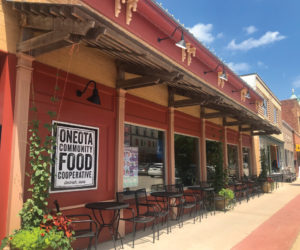By: Beth Hoven Rotto, Chill Buyer
It’s time to examine eggs available at Oneota Co-op. I’ve ordered eggs for the Co-op for years, and yet still have much to learn about chickens and our own suppliers. Recently I made a list of questions, called some of our producers and made a farm visit. Additionally, I’ve been doing some research, and I can tell you that I’ve definitely become more and more appreciative of our local egg suppliers. Elsewhere the typical, conventional egg comes from chickens raised in farms run like factories where the hens are, more than likely, packed in cages for their entire life. It’s the way big producers find most efficient, but it seems inhumane, unsanitary, and unhealthy. It’s not uncommon for a commercial hen house to contain 100,000 laying hens. Gruesome stories abound.
Our Organic Egg Supplier:
We carry Certified Organic eggs from Larry Schultz Organic Farm near Owatonna, Minnesota. This family farm has been organic for four generations and the entire family is involved in the business. We order eggs every week. We know they are very fresh, as they are candled and graded within 36 hours from when they are laid. Apparently large, commercial egg producers hold eggs for many days before they are graded and candled, which isn’t reflected on the carton sell by date. Eggs can last a long time if kept refrigerated, and a 50 day old egg may still fine, but obviously it’s not very fresh, which can impact its performance in baking and probably its nutritional value and taste. Larry Schultz USDA Certified Organic Eggs are high in Omega-3s and Vitamin E because flaxseed is added to the chicken’s feed. In fact, the family grows most of their own crops organically, grinds their own feed, and handles and grades their own eggs.
Larry brings in chickens at 18 weeks old, and is currently expecting to have 12,000 chickens on the farm. The chickens he gets have the sharp tip of their beak removed when they are very young with an infared process to ensure that the birds don’t injure each other if they are pecked. Although beak trimming is not a pleasant thing to think about, and there is pain involved in all the methods, the infared method is preferred in terms of animal welfare. There is no open wound and no evidence that the bird suffers lasting stress or pain. Although this might not be needed for backyard and small flocks, it has been proven that birds with beaks trimmed with the infared process are less aggressive, so for a commercial operation, this is a serious consideration. Hens at Larry Schultz Organic Farm stay in production for about 13-14 weeks, and after that time they are sold.
During the threat of Avian Influenza chickens were kept indoors, but that concern has dimished and the chickens are able to be out-of-doors again in fair weather. The hen house barn has windows and is also lit during winter days. With the help of other organic growers, Larry Schultz Organic label goes on 1,500 cases of eggs a week. I was invited to visit the packing house in Owatonna, Minnesota, but I haven’t had a chance to do that yet. We offer large and medium eggs from the Larry Schultz Farm.
One of our Suppliers of Free Range Eggs:
I visited Cedar Ridge Farm recently. Neal, his wife, Caroline, and his family are Amish farmers, and run their operation on solar power. They raise four flocks of Bovan Brown chickens for a total of approximately 950 chickens on the farm. Most of the chickens are housed in a new, light filled building with access to a large amount of outdoor space during fair weather. Most eggs are laid in a row of laying boxes that the chickens can jump in, and are covered for privacy, which the chickens like. Three times a day, at 8:00, 10:00 and noon, two of the children, ages 8 and 5, make the rounds to pick up any eggs that may have been laid on the ground or floor. Eggs are collected in pails and carried to a packing building nearby, although a packing room addition to the hen house is planned for this summer. Eggs are washed and dried on towels and individually candled and sized. I was impressed with the entire operation, the ethical treatment of the hens and the care of the product.
Unless farmers grow their own feed, it can be difficult to purchase non-GMO feed. This is the case for our supplier at Cedar Ridge Farm. Feed for their chickens is purchased at the feed store in Postville and contains conventionally raised corn and soybeans. “I would buy non-GMO feed, if I could,” says farmer Neal Lambright. The chickens drink spring water that is pumped into the hen house using a 12 volt system. We watched them scramble to get at a buckets of greens from neighboring Rolling Hills farm, obviously a treat and full of nutrition.
The chickens are purchased when they are 16 weeks old and they produce eggs for approximately a year. As the chickens get older, their shells become thinner and at some point they are not commercially suitable. Ninety two percent of the chickens produce an egg a day. If this number gets lower than 75%, that is another indication that the flock is getting too old. Then the chickens are sold to be stewing hens. The farm produces about 100 cases of eggs a day.
It was very noisy in the hen house and I thought it was because there were strangers in their space, but Neil said they are always noisy and that noisy hens are happy hens. They did seem happy. We offer extra-large and jumbo eggs from Cedar Ridge Farm, and they arrive on Wednesdays.
Another supplier of Free Range Eggs:
We have been buying eggs from Hanson’s since the 1980s. Esther Hanson brought eggs to the Co-op at that time, and she was helped by her son, Don. Don and his wife, Janet, continue to bring us eggs from the family farm outside of Postville. But don’t be surprised if you don’t see Hanson’s eggs on the shelf very often, even though we are their only retail outlet. That is because they have a very small flock. Currently they have about 20 chickens, and at most they have 30-35 hens. They bring eggs every two weeks on Tuesdays. The chickens roost in a chicken house that has been maintained for about 100 years. It has a new roof and windows, but Don says, “it’s nothing fancy.” The chickens are outdoors in the summer and indoors in the winter because Don says they don’t like to get their feet wet. Earlier this year, Don had a bit of a problem with the hens breaking their eggs. He thought they were perhaps getting bored, so he put a radio in the hen house to give them something to listen to. He says the problem is much better now that they are able to be outside every day. Besides eating grass, the chickens are fed corn raised on the farm with barley and ground alfalfa meal added, and feed from the feed store in Waukon. The hens lay their eggs early in the day, usually before 1 p.m., and Don checks 4-5 times a day to pick up the eggs when they are just laid. Then he refrigerates them until he washes and candles them in the kitchen. When eggs are candled, a bright light is used to look for cracks or “floating spots.” These become more likely if the egg is from an old hen. Don buys chickens when they are 3/4 grown, or pullets, at approximately 1 year old. He keeps them until they die of natural causes.
I know that producing eggs is a challenging business. We are very lucky to have choices among good local suppliers. Let’s give our producers a hand!



